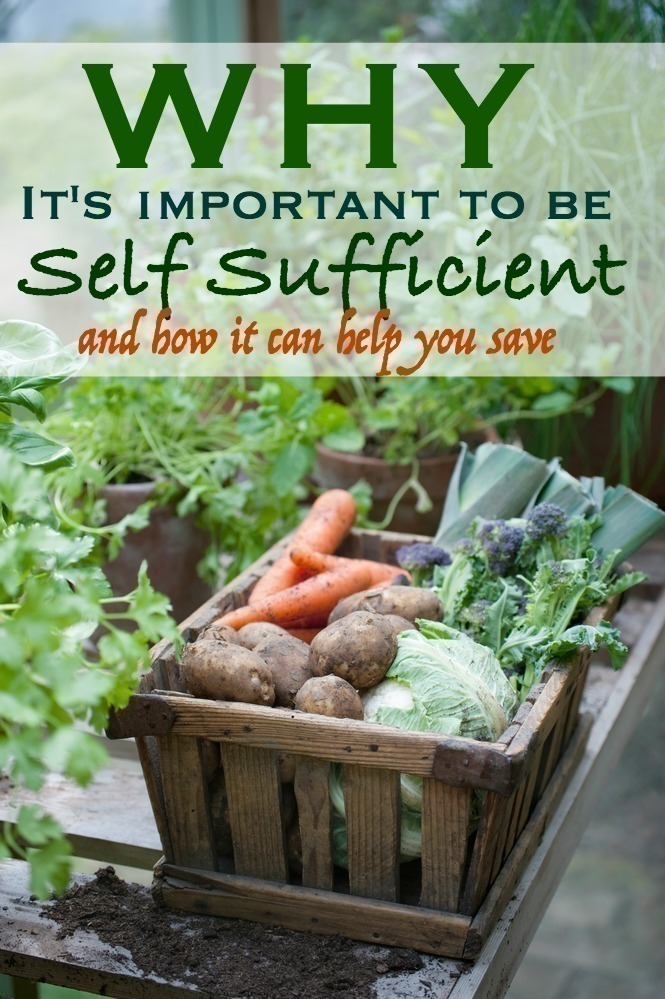
One of the most important things you can do to save yourself money, is becoming self sufficient – being self sufficient means you have the ability and have mastered the practice of providing for your own needs and those in your immediate family without outside resources.
Not only does it require skills, it also requires motivation and discipline. Today, it’s so incredibly easy to just rely on everyone and everything else to take care of us – from grocery shopping to retail stores & more.
Although not too many people may want to be self sufficient, who who do tend to be really passionate about the why they lean in that direction.
We try to take care of most things ourselves – aside from a monthly trip to Costco we don’t shop at the grocery much (if ever). One of the things we love to do is make our own yogurt. It’s amazing when you can support a local farmer who has your health in mind, to make your own yogurt, without relying on the stuff others might just find easier to buy in store.
I’m supporting a different chain, and that’s what is important to us.
But sometimes…. it takes certain things to happen for us to appreciate WHY we do things the way we do, and provide that affirmation that we are making the right choice.
Every week we make our own yogurt ~ making it is relatively easy, but requires a 1/2 c. of starter (for us, organic yogurt) that we can mix in as our starter culture. Normally we keep back 1/2 c. from our last batch but this past week my daughter wasn’t thinking and ate the last of all of the pints.
After we picked up milk at the farm this week, I took the kids to get just one, simple cup of Organic, plain vanilla yogurt at Safeway – unsuccessfully. They had 50+ other varieties, but not one regular, cup of “plain” organic yogurt — no, not even Stonyfield. The employee mentioned that I could come back with a rain check in a few weeks and get some, but unfortunately that does not help when you have yogurt cooling on the counter that needed that culture to finish the 8 hour yogurt period.
Onto Albertsons -across the street, where we had an even harder time. A whole quart was available for $6, but not one single cup. The gentleman mentioned that it didn’t matter, I could and should just pick up Chobani, after all, it’s “all the same”. Moving on, to Fry’s, and I found the same problem – perhaps it was the location we stopped at, but this particular flavor of regular, 4-6 oz, organic plain yogurt was not an option. Everything else was available, from Yoplait to Chobani, Dannon to Fruit on the Bottom.
Moving on, at this point after spending an hour toting kids into the store, It reaffirmed why I prefer making my own. After 3 stores, I finally moved north and drove an additional 20 minutes to Sprouts to get what I needed – but at that point I was frustrated and aggravated, not only with the fact that we have 3 major grocers that can’t stock this particular item, but with the feedback from the stores themselves “all of these yogurt varieties are the same”.
Sure, I probably could have found some at WinCo. Or Target. Or Whole Foods. But that’s not the point: the point is that we have major grocers that will tout their organic selection through ads, commercials, print and mailers, yet when it comes down to a customer who needs a simple item that SHOULD be carried there, not only is it not, but the managers can’t even give you a logical explanation as to why – except for: it’s all the same. No, it’s not the same frankly.
This exact experience is one of several reasons why we have opted to make our own yogurt – we’ll just make sure that next time my 9 year old gets hungry she doesn’t mistakenly use all of what is left and keeps a little for mom.
Right now, we rely on the grocery store to keep our family fed. We rely on Target to keep our family needs well stocked. We even rely on the electric companies for cooling here in Arizona – especially in the summer.
When you mention self sufficiency, the first thing that usually pops into mind for most are “I can’t because…”
I live in an apartment.
I live in the city.
I don’t have space for a garden.
I have kids.
I work and we don’t have time.
And the list could probably go on and on. Anyone can be self sufficient, no matter where they live, what job they have, or what their family situation dictates.
Why Would you Want to be more Self Sufficient?
Personal Reasons. Many people just gain a huge feeling a self satisfaction when they can do things themselves – they take pride in knowing that they don’t have to rely on any store, or family member for things that they can do on their own.
Social Reasons. MANY people who desire to be self sufficient see flaws in our current system. They are aware the the food industry relies too heavily on corn, and big industry looking out more for profits than health. They also might disagree with the state of the current system and would like to see more emphasis on local farmers and ranchers.
Political Reasons. Most people who opt to be more self sufficient see the real corruption that goes on within the government, including the lobbyists, and distrust from big corporations who are looking out for their dollar and their best interests over everything else.
To be Better Prepared. People who opt to be more self sufficient like to feel like they could take care of their family if a catastrophe happened.
Environmental Reasons. When you learn how to be self sufficient you are providing your support to an entirely different chain. Your footprint is reduced when you learn how to grow your own produce or rely on a CSA (as your food is not being transported across state lines or across the country). You are teaching your children how to reduce waste when you can shop in bulk instead of making daily trips to the grocery store.
HOW Can you Be More Self Sufficient?
Learn how to Cook from Scratch. Ditch the purchases at the grocery store and learn how to make your food. That involves stocking up on the bulk pantry staples that allow you to make those items – whether it’s soups or stews, breads or even canning – learn how to cut your own hair (including your kids and spouse). Go a step further and learn how to sew up rips and tears, and learn how to make your own beauty & cosmetic items. Not only will it save you money long term, it’ll give you more satisfaction that you can do it yourself without relying on someone else.
Plant a Garden. We are in our 4th year of having a garden – no matter where you live or what your weather is, anyone can start a garden. If you have little space, then work with what you have to create one on your back porch, your windowsill or even container garden IN the house (specific plants only). Not only will you be able to control how your garden grows and what goes on it, you will save yourself unnecessary trips to the grocery store, too.
Stock up on Pantry Staples. Healthy pantry staples are relatively inexpensive to have on hand – from Lentils to Steel Cut Oats, dry Beans, Rice, Coconut Milk and even Pasta, it’s essential to have items on hand that you can use to whip into fast, inexpensive (and healthy) meals like Lentil Soup, Coconut Rice, and Mexican Refried Beans. Skip the trip to the store for sugared kids cereal and stick with Steel Cut Oats, which will not only last longer, they will keep them fuller faster.
Learn to be Content. Learning to be content eliminates unnecessary trips to the grocery store for items you may not have necessarily needed. Learn how to have simple fun with the kids without spending money. It requires the discipline to accept & be happy with what you have, including making what you currently own work for you instead of living a life of discontentment and feeling the need to buy something new all the time.
Self Education. Learn how to do things for yourself – from your own self care to cooking, home repairs and even perhaps self employment. Research why it’s important to be aware of how each can make an impact on your desire to be more self sufficient.
Work to Improve your Finances. Getting out of a debt is essential for self sufficiency – if you are in debt work towards paying off what you owe, and put more effort into your spending habits to control where your money goes. Start an Emergency Fund, and learn how to cut your expenses by cutting back on unnecessary purchases or items that are regular monthly expenses.
Not only is learning how to do things yourself important, learning how to buy quality items instead of more cheaper items that will need to be replaced, is also important too.
How to Start?
Start by doing haircuts at home (yes, that means everyone – even Mom!), starting a compost in your backyard, gardening, home-cooking (and not a fast food drive through), and if you can, homeschool. If you can’t grow a large enough garden, consider a CSA to support a local farmer. Learn how to take care of your own through self care instead of relying on a medical system and prescriptions that may essentially be doing you more harm than good. Learn more about your food, and do your own self research to understand why these options are not mainstream, but might be better for your family.
As you try to move in that direction, one thing to remember though about self sufficiency is that you can’t, and won’t be able to do everything yourself.
Every family is different … so you do what works best for you at this point in time, and leave room for improvement.



